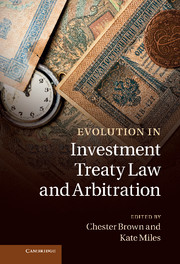Book contents
- Frontmatter
- Contents
- Contributors
- Editors' preface and acknowledgements
- Table of cases
- Table of Treaties
- Part I Introduction
- Part II Shifts in fundamental character
- Part III Actors in international investment law
- Part IV The new significance of procedure
- Part V Engagement with cross-cutting issues
- 21 Protecting intellectual property rights under BITs, FTAs and TRIPS: Conflicting regimes or mutual coherence?
- 22 Stabilisation clauses and sustainable development: Drafting for the future
- 23 A new investment deal in Asia and Africa: Land leases to foreign investors
- 24 Thirst for profit: Water privatisation, investment law and a human right to water
- 25 Economic development at the core of the international investment regime
- 26 Regulatory chill and the threat of arbitration: A view from political science
- Part VI Conclusions
- Index
- References
26 - Regulatory chill and the threat of arbitration: A view from political science
from Part V - Engagement with cross-cutting issues
Published online by Cambridge University Press: 05 December 2011
- Frontmatter
- Contents
- Contributors
- Editors' preface and acknowledgements
- Table of cases
- Table of Treaties
- Part I Introduction
- Part II Shifts in fundamental character
- Part III Actors in international investment law
- Part IV The new significance of procedure
- Part V Engagement with cross-cutting issues
- 21 Protecting intellectual property rights under BITs, FTAs and TRIPS: Conflicting regimes or mutual coherence?
- 22 Stabilisation clauses and sustainable development: Drafting for the future
- 23 A new investment deal in Asia and Africa: Land leases to foreign investors
- 24 Thirst for profit: Water privatisation, investment law and a human right to water
- 25 Economic development at the core of the international investment regime
- 26 Regulatory chill and the threat of arbitration: A view from political science
- Part VI Conclusions
- Index
- References
Summary
Introduction
The academic literature on international investment treaties, foreign investment contracts and investor–State dispute settlement is dominated by legal analysis. This is understandable in light of the complexity and, until recently, relative obscurity of the field. However, it is imperative that scholars from other disciplines now become more actively engaged in the critical debates surrounding investment law and investment arbitration in particular. One example of an issue that has been inadequately addressed and often prematurely dismissed by legal scholars is ‘regulatory chill’. Fundamentally, the notion of regulatory chill suggests that investment arbitration – as an institution – may influence the course of policy development. For reasons that will be laid out in this chapter, investigating regulatory chill requires methods and approaches more familiar to political scientists than to lawyers.
The regulatory chill hypothesis
Soloway suggests that the ‘meaning of the term “regulatory chill” is not clear’. This is a fair critique; the vast majority of scholars and non-governmental organisations (NGOs) that have referred to regulatory chill in the context of discussions about investor–State dispute settlement have not precisely articulated what their understanding of the term is. That being said, it should be self-evident that these commentators were not implying that regulators would ‘cease to adopt any new regulations and that the entire environmental regulatory framework [would grind] to a halt’. Similarly, it is highly unlikely that anyone who has expressed a concern about regulatory chill would argue that regulators should be permitted to discriminate, ‘unduly’, against foreign investors.
- Type
- Chapter
- Information
- Evolution in Investment Treaty Law and Arbitration , pp. 606 - 628Publisher: Cambridge University PressPrint publication year: 2011
References
- 81
- Cited by



